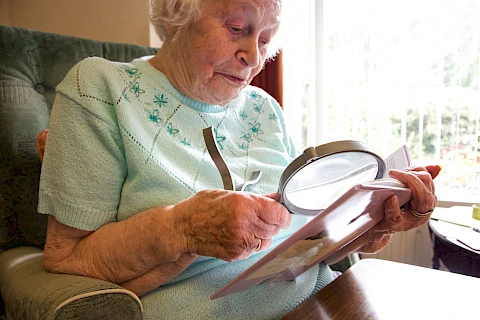
As we age, vision impairments become more common and can significantly impact daily life. Fortunately, assistive technologies can help seniors maintain their independence and quality of life. Senior Helpers Princeton will guide caregivers in selecting and using these technologies effectively for seniors with vision impairments.
Vision Impairments in Seniors
Vision impairments can vary widely among seniors. Common types include macular degeneration, glaucoma, diabetic retinopathy, and cataracts. These conditions can make it difficult to read, recognize faces, and navigate spaces, affecting daily activities and overall well-being.
Types of Assistive Technologies for Vision Impairments
There are several assistive technologies available to help seniors cope with vision loss. Magnifying devices are essential tools for many seniors with vision impairments. Handheld magnifiers are simple, portable devices that enlarge text and images, making them easier to see. They come in various sizes and magnification levels. Electronic magnifiers offer higher magnification and additional features. These can be handheld or desktop devices that display enlarged text on a screen, with some even connecting to TVs or computers for greater flexibility.
Talking watches are designed to announce the time aloud at the press of a button. They are helpful for seniors who have difficulty reading traditional watch faces. Popular models include the Timechant Talking Atomic Watch and the Reizen Digital Analog Talking Watch. These watches often feature clear, loud voices and simple controls, making them easy for those with vision impairments.
Screen-reading software is another valuable tool for visually impaired seniors. This software reads aloud the text displayed on a computer or mobile device screen, helping users navigate the internet, read emails, and use various applications. Popular programs include JAWS (Job Access With Speech) and NVDA (NonVisual Desktop Access), which offer a range of features to assist with different tasks.
Selecting the Right Assistive Technology
Choosing the right assistive technology involves several steps. First, assess the individual needs and preferences of the senior. Consider their vision impairment, daily activities, and personal comfort level with technology. Next, consult with healthcare professionals such as optometrists and occupational therapists, who can provide valuable insights and recommendations based on individual assessments.
Whenever possible, allow the senior to try different devices before purchasing. This ensures they choose a device they find easy to use and effective. Many stores and organizations offer trial periods or demonstrations, which can be invaluable in making the right choice.
Tips for Training and Support
Once you've selected the right device, provide hands-on training sessions to help seniors become familiar with their new devices. Practice sessions can build confidence and competence in using the technology.
Utilize online tutorials and resources provided by manufacturers. These can offer additional instruction and troubleshooting tips. Encourage patience and regular practice, as learning new technology can be challenging. Over time, seniors will become more comfortable and proficient with their assistive devices.
Resources for Further Assistance
Connecting with additional resources can provide ongoing support and assistance. Local support groups and organizations often offer resources and advice, as well as a sense of community and shared experience. Online forums like Reddit and specialized communities can offer peer support, advice, and troubleshooting tips from others who use similar technologies.
Contact Senior Helpers for Assistance With Senior Care
By selecting the right tools and providing proper training and support, caregivers can significantly improve the quality of life for their loved ones. For personalized senior care services in Princeton, Plainsboro, Princeton Junction, Hopewell, and Pennington, contact us at Senior Helpers Princeton. We're here to help you navigate the world of assistive technologies with confidence.